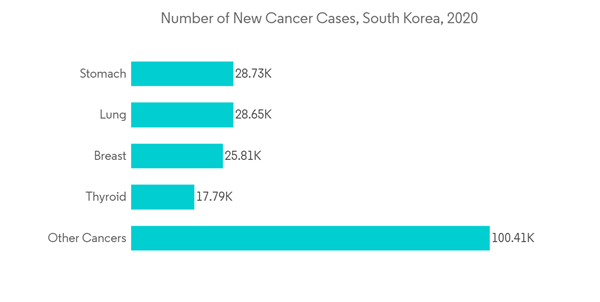The COVID-19 pandemic affected the market studied severely which was majorly due to the restrictions on non-emergency diagnostic procedures as a preventive major of coronavirus infection. As per an article published in March 2021, 'A critical juncture in universal healthcare: insights from South Korea's COVID-19 experience for the United Kingdom to consider,' the South Korean universal healthcare system, in particular, has been praised for its achievement in flattening the curve of confirmed COVID-19 cases. However, the pandemic has created stressful situations in the initial times. It created many adverse complications in patients. In some places, the lack of healthcare facilities caused difficulties in getting the right therapy. An MRI scan is used to track the progression of COVID-19 symptoms. Neurologic manifestations of COVID-19 are associated with MRI scans of abnormal brains and symptoms of anosmia, partial loss of sense of smell, or changes in taste in a patient with a severe case of COVID-19. Likewise, there are many effects associated with COVID-19 infection reviewed theoretically and practically. Most of them needed MRI imaging to identify the possible changes. Hence, with the use of MRI in South Korea in understanding the adverse effects of COVID-19 on other organs, the market studied was witnessing a gradual rate of growth during the years 2020 and 2021. However, the market is gaining pace currently as there has been a surge in elective diagnostics or procedures.
The major factors that are expected to drive the growth of the magnetic resonance imaging (MRI) market in South Korea include the presence of a large geriatric population, advanced healthcare infrastructure, and new product launches in the country. Furthermore, increasing prevalence and burden of chronic diseases is fueling the market growth in South Korea. For instance, As per the article titled 'Health-economic burden of dementia in South Korea' published by BMC in October 2021, the prevalence of dementia in Korea in the year 2020 was 10.25% among those aged 65 and above which accounted for around 8,30,000 people. It is anticipated to rise to nearly 15.91% by 2050, with a population of 3.02 million suffering from dementia. Thus, increasing cases of dementia in the future will create the demand for MRI scans in the country and will contribute to the market growth.
South Korea Magnetic Resonance Imaging Market Trends
High-Field MRI Systems are Expected to Witness Healthy Growth Over the Forecast Period
Technological advancements in high-field MRI scanners are expected to drive the growth of high-field MRI scanners in this region. For instance, in 2021, Elekta Korea launched their Elekta Unity radiation treatment system, which combines magnetic resonance imaging and a linear accelerator. Philips' high-resolution 1.5 teslas (T) MRI scanner and seven-megavolt linear accelerator are combined in the Elekta Unity. It delivers high-resolution MRI scans incorporating patients' anatomy and biological information, enabling tailored radiation therapy based on tumor characteristics.The rising adoption of high-field MRI scanners in South Korea is also expected to propel the market growth for this segment. For instance, in 2020, Vantage Elan, a high-tech 1.5 Tesla magnetic resonance imaging (MRI) system from Canon Medical Systems Korea, was installed at Sesonneun Orthopedic Hospital in Korea to get super-precise imaging of the spine and joint.
The development of Magnetic Resonance (MR) software by local startup companies in South Korea is contributing to the surge in the high-field MRI scanners market. For instance, in the year 2021, AIRS Medical Inc., a South Korean healthcare firm, received the Food and Drug Administration approval for its initial product SwiftMR. It is an AI-powered MRI reconstruction program that improves MR images recorded under a variety of situations, resulting in increased throughput and improved patient experience.
Hence, the above developments in high-field MRI systems, it is expected to drive market growth.
South Korea Magnetic Resonance Imaging Industry Overview
The South Korea magnetic resonance imaging market is highly competitive and consists of several major players. In terms of market share, a few of the major players currently dominate the market. However, with technological advancements and quality service provisions, mid-size to smaller companies are increasing their market presence by introducing new products at less prices. Companies, like Siemens Healthineers, GE Healthcare, Canon Medical Systems, and Philips Healthcare, hold a significant market share in the magnetic resonance imaging market.Additional Benefits:
- The market estimate (ME) sheet in Excel format
- 3 months of analyst support
This product will be delivered within 2 business days.









